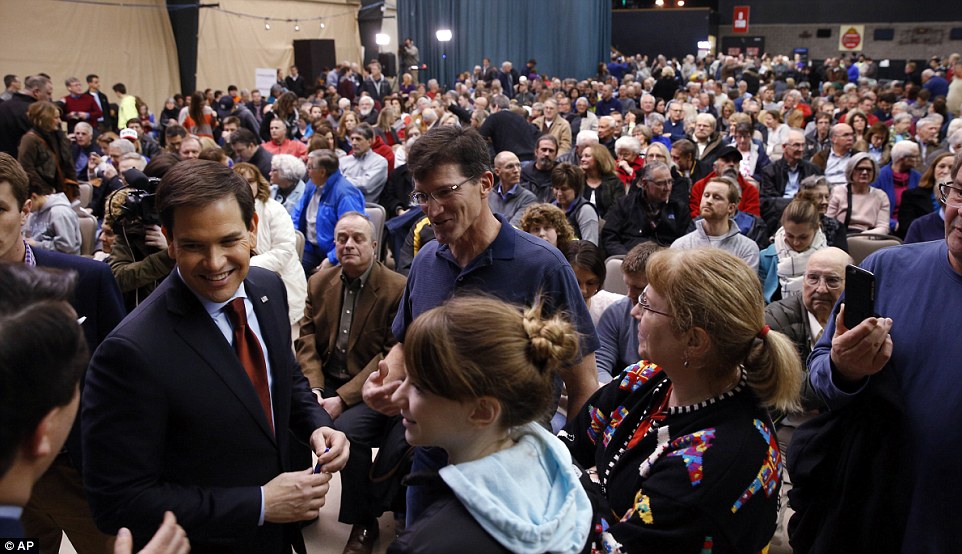PHOTO: Republican candidate Marco Rubio with supporters in Iowa on Monday night (AP)
The votes have been counted in the first contest of the 2016 Presidential campaign, the caucuses in Iowa, and the winners are….
The Democratic Party and the Republican candidate Senator Marco Rubio.
That may come as a surprise given that another Senator, Ted Cruz of Texas, topped the Republican poll, ahead of tycoon and reality TV star Donald Trump and Florida’s Rubio. And the Democrat success may surprise outlets like CNN, focused on trying to break the “virtual tie” between Hillary Clinton and Vermont Senator Bernie Sanders.
But the key here is not just the final vote tally: it’s about the Establishment and Expectations.
How Rubio Won by Finishing 3rd
Rubio “only” finished third with 23%, behind Cruz (28%) and Trump (24%).
But that is far closer than polls in Iowa had predicted for weeks, with the Florida Senator stuck and even receding at 13%. There were signs after the final Republican debate, which Trump skipped, that Rubio had done well with both pundits and undecided voters; however, no one had expected the surge that almost took him into second place on Monday night.
Doing so, he offered a likely answer to the puzzling question: how are the Republican establishment going to stop Trump and Cruz, neither of whom are seen as winners in November’s contest against Clinton?
With Jeb Bush falling into oblivion and other Republican Senators or Governors scrambling to get attention, Rubio appeared to be the best option to Trump’s bombastic approach — likely to alienate the key votes in the “center” of US politics this autumn — and Cruz’s base with the Tea Party and evangelicals. However, he did not seem to be able to capitalize through the winter’s debates and other public skirmishes.
Now he has. He is still a remote hope to win next Tuesday’s New Hampshire primary, but another solid showing will put him in position to rally political endorsements and big money for the important contests that begin in March.
That is likely to be bad news for the other candidates, notably Bush, New Jersey Governor Chris Christie, and Ohio Governor John Kasich. Each was hoping that he could be the Establishment Alternative with a breakthrough in New Hampshire. But barring an unexpectedly strong run to overtake or run alongside Cruz, Trump, and Rubio, that is unlikely to happen.
A Victory for Democratic Unity
On the surface, Sanders’ strong showing against Clinton makes for a dramatic narrative for the hungry media of a Sudden Contest for the nomination. That will continue when Sanders triumphs in his neighboring state of New Hampshire next Tuesday.
But don’t be fooled. This is not Obama 2008 and another upset of Hillary’s procession to the Presidency. Sanders will appeal to the Democratic “progressives” and mobilize a lot of young voters, but he will need a surprise upset in a big state to make a lasting impression. Given the weight of the Democratic Party’s machinery and funds behind Clinton, as well as her own extensive networks after 25 years in and close to the White House, she should secure the nomination when the bulk of primaries are held in March.
And that will be accompanied by a Democratic message of “unity”. The speeches of both Clinton and Sanders were marked last night, as they have been for weeks, by mutual respect and proclamation of the core Democratic messages — economic stability, security in health care, and social progress. That has been a marked contrast to the Trump-led sniping and Alpha Male Posturing distinguishing the Republican contest so far.
Those with longer memories in the Democratic camp will remember how the White House was handed to George W. Bush in 2000 not only by dubious votes in Florida but also by the third-party candidacy of the progressive Ralph Nader. That episode will not be repeated in 2016.
![]()

